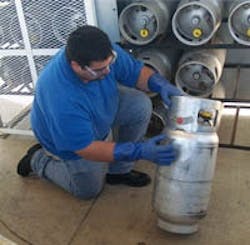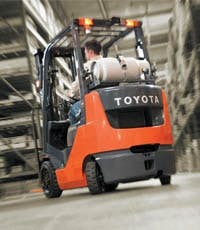Propane-fueled material handling
More than 600,000 propane-fueled forklifts currently operate in U.S. factories, warehouses, and distribution centers today.
Marietta (www.mariettacorp.com) is a global manufacturer of hotel amenities and consumer-packaged goods. Its Chicago-area facility, located in the city’s southeastern suburbs, primarily manufactures laundry and dishwashing soap and relies extensively on its forklifts for a wide range of material handling needs, including shipping, production and receiving. When its forklift lease was set to expire in 2007, facility logistic distribution manager Jesse Gomez encouraged his team to investigate propane-fueled forklifts.
After conducting a cost/benefit analysis comparing propane-fueled forklifts with incumbent electric-powered models, the company leased 14 propane-fueled units from Toyota Material Handling (www.toyotaforklift.com). The facility realized an immediate improvement in forklift performance, space availability and operating costs, and, since then, sales at the plant have increased, due in part to the increased productivity the propane-fueled forklifts have offered, says Gomez. “My staff is completing more work in fewer hours,” he says, “and everyone is excited about that.”
High performance
The forklifts used in Marietta’s Chicago facility are only a few of the 600,000 propane-fueled models currently operating in U.S. factories, warehouses and distribution centers. Propane-fueled forklifts maintain consistent, 100% power throughout operation and have faster ground speeds than electric forklifts, explains Brian Feehan, vice president of the Propane Education & Research Council (www.propanecouncil.org). That provides the Marietta facility a major advantage, since its forklifts must run 20 hr/day for maximum efficiency.
“Before 2007, the facility exclusively used electric-powered forklifts, which created challenges as they were only able to run for one shift before requiring a time- and labor-intensive battery switch and recharge,” says Feehan. “That process entailed using heavy-lifting equipment to remove a depleted 4,000-lb battery, replacing it with a fully charged counterpart and then placing it in a charging station that took up a substantial amount of floor space.”
While the facility’s work productivity had been limited due to changing out and recharging batteries, the introduction of propane-fueled forklifts helped streamline the refueling process. “Replacing propane cylinders doesn’t require heavy lifting and is less time- and labor-intensive than refueling with other fuel sources or power technologies,” explains Feehan. “Plus, it takes less time to fill a propane cylinder than to switch a battery, and far less time to fill or switch a propane cylinder than to charge a battery and wait for it to cool.”
Easy refueling
That was just the beginning of the advantages Gomez and his team realized. The forklift market has an established propane delivery infrastructure for refueling, which Marietta’s Chicago facility uses. The facility purchases propane from Atlas Mid-America, a local propane provider, which delivers propane directly to the plant, refills empty propane cylinders on-site and then stores them outdoors.
That approach has opened substantial space on the facility’s production floor, which previously was only able to run two production lines per day. Since the transition to propane-fueled forklifts, it consistently runs four to five production lines per day for 20 hr/day, four days per week. If demand requires, the facility also has the ability to run up to 24 hr/day, seven days per week.
A local propane provider can deliver propane directly to facilities, refill empty propane cylinders on-site and then store them outdoors.
Those attributes are complemented by significant cost savings. The lease for the propane-fueled forklifts, including all required fleet maintenance, was $105,000, which created an upfront savings of about $25,000 compared with the lease for the facility’s electric-powered forklifts. Reduced maintenance in the first three months alone translated to an additional cost savings of more than $15,000, explains Gomez. And the facility is able to lock in six-month contract pricing with Atlas Mid-America, making ongoing propane fuel costs more predictable.
Gomez says sales have increased by about $3 million at the facility, due partly to the increased productivity that has been gained since the switch to propane-fueled forklifts.
The future
Gomez is quick to point out that Marietta’s Chicago facility also saves money by no longer sending dead batteries to a landfill. Elimination of that waste stream has allowed the facility to be more environmentally focused.
The Propane Education & Research Council was authorized by the U.S. Congress with the passage of Public Law 104-284, the Propane Education and Research Act (PERA), signed into law on Oct. 11, 1996. The mission of the Propane Education & Research Council is to promote the safe, efficient use of odorized propane gas as a preferred energy source through research and development, training and safety initiatives.


